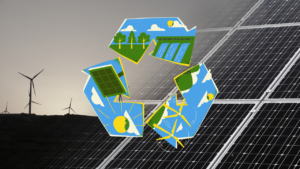Physical Address
23,24,25 & 26, 2nd Floor, Software Technology Park India, Opp: Garware Stadium,MIDC, Chikalthana, Aurangabad, Maharashtra – 431001 India
Physical Address
23,24,25 & 26, 2nd Floor, Software Technology Park India, Opp: Garware Stadium,MIDC, Chikalthana, Aurangabad, Maharashtra – 431001 India

CLAIM
Renewable energy is unaffordable and costlier than fossil fuels.
FACT
Renewables were the world’s cheapest source of energy in 2020. They are fast becoming cheaper than fossil fuels. Building new renewables is now cheaper than burning fossil fuels.
SOURCE OF THE CLAIM
We found a video on Facebook which had this claim, among a few others.
WHAT THEY SAY
Projecting renewable energy as a better alternative to fossil fuels is not practical as renewable energy is much costlier in comparison to fossil fuels. Renewable energy is not affordable on a global scale to cater to the huge energy demands of the increasing population of the planet.
WHAT WE FOUND
Renewable energy is often termed ‘clean’ energy. It is collected from natural, renewable resources that are naturally and constantly replenished. Some of the sources of renewable energy include sunlight, wind, rain, tides, waves, and geothermal heat.
While the technology of harnessing nature’s power is evolving every year, the concept itself is nothing new for humanity. We have been harnessing natural power like the wind to sail on the sea using boats and grind grain using windmills for ages.
Since the industrial revolution, humans are increasingly using ‘cheaper and dirtier energy sources like fossil fuels. However, fossil fuels are only available in ‘limited’ amounts, unlike the ‘unlimited’ energy source that renewables like wind and sunlight provide to us. The only ‘positive’ of fossil fuels like coal was that they were ‘comparatively cheaper’ than renewable energy.
AFFORDABLE AND CHEAPER ALTERNATIVE
As technology is beginning to advance, the cost of using renewable energy has come down dramatically making it affordable and even ‘cheaper’ in comparison to the cheapest fossil fuels. International Renewable Energy Agency’s (IRENA) report, Renewable Power Generation Costs in 2020, ‘finds that costs for renewable technologies are continuing to fall “significantly” year-on-year’. It is now cheaper to build new renewables than burning fossil fuels. The construction and operation costs of a large-scale solar and wind plant are cheaper than running an already existing power plant running on coal or gas in almost half of the world. A report by the International Energy Agency (IEA) report also states that Solar is now cheaper than the creation of new coal or gas-fired power plants. The cost of large-scale solar projects has come down by 85% in a decade.

According to an analysis by BloombergNEF, ‘cheapest solar projects in Chile, India, the UAE, China, Brazil, and Spain can produce power for as little as $22 per megawatt-hour.’ It is cheaper to build a new large-scale solar plant than to run an existing power plant fuelled by coal in countries like India, China, and Germany, according to the BNEF.
Most energy-economy studies have failed to gauge the dramatic rise of technology in terms of renewable energy leading to an overestimation of their costs. This had acted as a hindrance in the implementation of renewable energy technology in place of traditional energy technology involving fossil fuels. According to a report out at the Institute of New Economic Thinking, the University of Oxford, a quick shift to renewables rather than sticking with fossil fuels could save trillions of dollars.
While volatile energy commodity prices have been sharply increasing globally, renewable technologies have been steadily decreasing. Over the last decade, the cost of electricity from utility-scale solar PV has fallen by 85 percent, concentrating solar power (CSP) by 68 percent, onshore wind by 56 percent, and 48 percent for offshore wind, according to the International Renewable Energy Agency (IRENA).
RENEWABLES – CLEANER ALTERNATIVE
With renewables becoming cheaper than the traditional fossil fuel-based energy in the power sector, the demand for renewables is rising. The icing on the cake is the fact that renewables are a much ‘cleaner’ alternative than ‘dirty’ fossil fuels with the benefit of lower emissions of carbon and other pollutants.
Decarbonizing the global energy system is crucial for global warming and climate change. Renewables with their ‘clean’ emissions could help in limiting the global temperatures within the crucial 1.5-degree celsius threshold.
According to the report at the Institute of New Economic Thinking, University of Oxford, “if solar, wind and the myriad other green energy tools followed the deployment trends they are projected to see in the next decade, in 25 years the world could potentially see a net-zero energy system.”
FOSSIL FUELS – COSTLIER AND DIRTIER
According to a notable study by an independent technology think tank- RethinkX, conventional electric power plants powered by fossil fuels and hydro are being massively overvalued. The study finds that mainstream (Levelized Cost of Energy) LCOE assessments for conventional coal, gas, nuclear, and hydropower plants are false and the difference is by up to 400 percent.
The same study also projects that “the costs of electricity generation in 10 years will be nine times higher for coal, nearly five times higher for gas, nearly 14 times higher for nuclear, and nine times higher for hydro.” This not only points to the bleak future for fossil fuels but also means that these energy systems are vastly more expensive than thought.
Meanwhile, higher natural gas prices have led to increased coal usage in some countries resulting in greater CO2 emissions according to a report by the US Energy Information Administration. This has led to an exponential rise in the coal prices across many countries like Australia and South Africa and the continuous rise in coal demand at thermal plants across Asia is only further adding to the rise.
Global investors are increasingly shifting away from fossil fuels to renewable energy projects, states an IEEFA (Institute for Energy Economics and Financial Analysis) report on global investments in renewable energy.

Category: